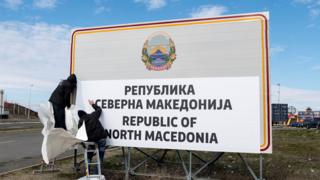EU sees progress in Balkan states’ bids to join
Albania and North Macedonia have made good progress towards EU membership and Brussels should open accession talks with them, the EU Commission says.
Both have official “candidate” status in their EU membership bids. The last country to join was Croatia, in 2013.
Since then, leaders in Austria, France and the Netherlands have expressed caution about further EU enlargement.
The Commission, steering the talks, said “serious backsliding” in Turkey meant that its bid remained frozen.
The question of further EU enlargement is likely to come up at an EU summit next month, but a decision on opening accession talks with Albania and North Macedonia may be delayed until an EU foreign ministers’ meeting in July.
See the Commission’s recommendations in full here.
EU foreign affairs chief Federica Mogherini said the past year had seen “positive change” in the Balkans, and “Albania and North Macedonia have shown a strong determination to advance on the EU path”.
EU Enlargement Commissioner Johannes Hahn said both countries had “delivered on reforms”.
“North Macedonia not only continued its ambitious reform agenda, but also reached a historic agreement with Greece, resolving a 27-year-old name dispute, an example for the entire region and beyond,” he said.
“Albania is pursuing profound reforms, in particular a major transformation of its justice system.”
In January Greek Prime Minister Alexis Tsipras completed a deal to end Greece’s long-running name row with neighbouring North Macedonia, which he visited in April.
Greece had always objected to its neighbour’s designation as “Macedonia”, because of the northern Greek province of the same name.
Strategic region
The Commission sees its strategy of integration with Balkan countries as a tool for stabilisation, in a region that was convulsed by conflict in the 1990s.
Countries seeking EU membership have to meet a long list of requirements, including: justice reform, rule of law, anti-corruption measures, functioning democratic institutions, media freedom and economic competitiveness.
There are three other candidate countries in the queue to join: Montenegro, Serbia and Turkey. All three have opened accession negotiations, but Turkey’s are at a standstill.
The Commission said Turkey under President Recep Tayyip Erdogan had “continued to move further away from the European Union”, noting that rule of law, human rights and political checks and balances had all been undermined.
Bosnia-Herzegovina and Kosovo are potential candidates, but the Commission says it is still too early to open accession talks with them.
There are widespread concerns in the EU about illegal migration via the Balkans, with some countries seen as back-door smuggling routes.
Migrant numbers have dropped sharply since 2016, when EU-led restrictions were imposed at borders in the Balkans and Turkey tightened its controls.
Source: Read Full Article



